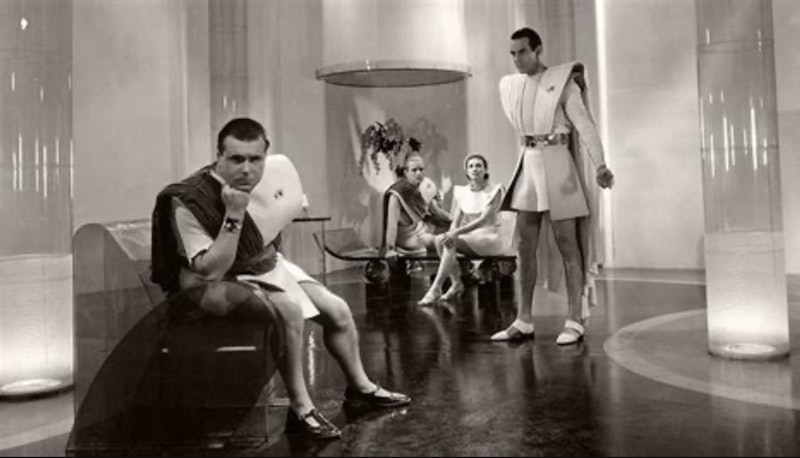One gets a chilling view of the future from the 1936 science-fiction movie Things to Come, written by H.G. Wells. The story opens in the bustling city of Everytown in 1940, where businessman John Cabal fears that war’s imminent. He’s right. The world war lasts into the 1960s, leaving societies in rubble and ridden by plague. Warlords rule, including Rudolf, Everytown’s fur-festooned master. Most technology’s been destroyed. This bleak period, circa 1970, won’t last, but what follows is disturbing in its own way.
A small plane lands in Everytown, the first working aircraft seen there in years. It’s Cabal, now gray-haired. He tells Rudolf that Wings Over the World, an organization of aviators and technologists, operating from a headquarters in Basra, Iraq, is restoring civilization and abolishing war worldwide. The warlord’s uncooperative, having Cabal arrested despite a warning that the airman’s colleagues know where he is. Soon, huge flying wings fill the sky. Rudolf attempts a defense, but his efforts are pitiful. The air fleet unleashes a gas that puts residents to sleep, inadvertently killing the warlord. Wings Over the World takes over. Rudolf’s dead, Cabal notes, and so is his world.
Fast-forward to 2036. Technology’s reached unprecedented heights. Everytown’s a gleaming city of massive buildings and industrial facilities. Power’s now in the hands of Oswald Cabal, grandson of John (both played by Raymond Massey). People wear short white tunics, which look better on the women. There’s a plan to use a “space gun” to launch a capsule with two astronauts to go around the moon; landing on the moon is a longer-term goal. But a sculptor’s stirred up an angry crowd against such tech progress, so the launch is moved up. The astronauts are Cabal’s daughter and a fellow scientist who’s the son of his colleague Passworthy; the leaders have decided their own offspring should bear the risks of space. The mission launches, and Cabal intones: “All the universe or nothingness. Which shall it be, Passworthy? Which shall it be?”
In the real-world 2020s, in today’s conflicts between populism and technocracy, my sympathies tend toward the technocratic. As a science writer, editor and fact-checker, I’m not one to cheer when the masses rally against expert opinion on matters ranging from vaccines to UFOs (or UAPs) to evolution. I’m averse to conspiracy theories about bio-labs or microchips, and unmoved by any political argument that claims something’s good because “the establishment” says it’s bad. Still, even by my standards, the technocratic vision of Things to Come is off-putting, with its unironic celebration of a benevolent, knowledge-based elite enforcing its will over the ignorant and backward.
Elitism and populism take many forms, and sometimes aren’t what they seem. Revolts of parents against school and library bureaucracies have a populist tone, but follow a playbook devised by elite types at conservative think tanks. Black Lives Matter’s a grassroots movement, but it got an imprimatur from progressive technocrats who in mid-2020, after months of pressing for Covid restrictions, advocated a BLM exemption, because, as one epidemiologist put it, “In this moment the public health risks of not protesting to demand an end to systemic racism greatly exceed the harms of the virus.”
Anxiety about artificial intelligence has surged lately, but its most visible emanations have come not from any populist movement of technophobes but rather from the tech industry itself. This has stirred suspicions that tech execs’ warnings about how unchecked AI could cause “human extinction” are an elaborate form of marketing, aimed at underscoring the technology’s power, and atfocusing public and regulatory attention away from current problems and toward futuristic scenarios instead.
Brink Lindsey of the Niskanen Center has written about an “anti-Promethean backlash” that first took shape in the 1960s and 1970s, with environmentalists spearheading a “broad-based cultural turn away from those forms of technological progress that extend and amplify human mastery over the physical world.” It’s a massive shift from the sensibility put forward in Things to Come, not least in that it’s to a large degree the affluent and well-educated who now take a not-in-my-backyard opposition to industrial and infrastructure projects that would’ve fit in well in 21st-century Everytown.
Arthur C. Clarke encouraged Stanley Kubrick to watch Things to Come as an example of well-grounded sci-fi before Kubrick made his 1968 2001: A Space Odyssey, based on Clarke’s novel. Kubrick reportedly didn’t like the 1936 film, and his own sci-fi classic conveys far less enthusiasm about how technology can expand human powers. Posters advertised 2001 as the “ultimate trip,” a nod to the counterculture’s interest in the psychedelic. The 1960s didn’t have zombie-like plague victims as H.G. Wells had imagined, but it marked cultural turns that Things to Come’s visionary writer might’ve found equally repulsive.
—Kenneth Silber is author of In DeWitt’s Footsteps: Seeing History on the Erie Canal and posts at Post.News.

